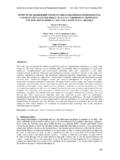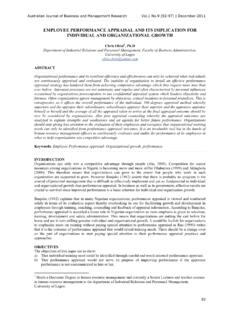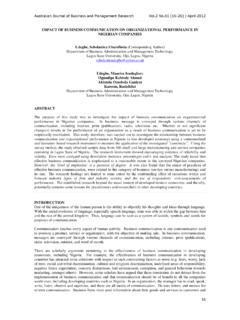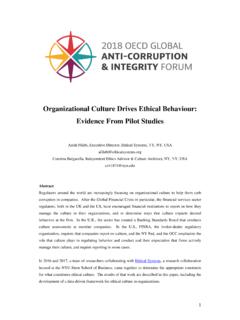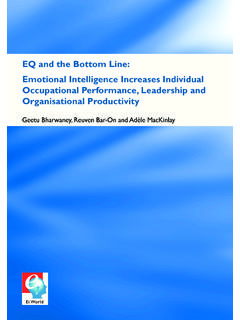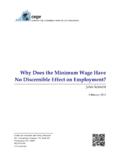Transcription of FACTORS AFFECTING EMPLOYEE JOB SATISFACTION OF ...
1 Australian Journal of Business and Management Research [113-123] | December-2011 113 FACTORS AFFECTING EMPLOYEE JOB SATISFACTION OF PHARMACEUTICAL SECTOR Mosammod Mahamuda Parvin: Corresponding Author Lecturer, Department of Management and Finance Sher-e-Bangla Agricultural University, Dhaka M M Nurul Kabir Lecturer, Departmrnt of Management Govt. Shohid Suharwardy College, Dhaka ABSTRACT The Pharmaceutical sector plays a vital role in underpinning the economic development of a country. This study attempts to evaluate job SATISFACTION of employees in different pharmaceutical companies. It focuses on the relative importance of job SATISFACTION FACTORS and their impacts on the overall job SATISFACTION of employees.
2 It also investigates the impacts of pharmaceutical type, work experience, age, and sex differences on the attitudes toward job SATISFACTION . The result shows that salary, efficiency in work , fringe supervision, and co-worker relation are the most important FACTORS contributing to job SATISFACTION . The overall job SATISFACTION of the employees in pharmaceutical sector is at the positive level. The nature of business operation, the work culture and the level of job SATISFACTION have undergone sea change for the pharmaceutical companies. As a business proposition initiated huge investment whereas majority of their stocks is going down bringing a high level of apprehension related to job security among its employees.
3 This research paper highlights some of these problems and presents a picture of level of job SATISFACTION among employees of pharmaceutical companies. It also identifies unique issues of job SATISFACTION in the companies. Pharmaceuticals Companies are selected for the research because they are currently undergoing continued expansion. In order to gain competitive advantage and adapt to the dramatic changing environment, it is important for them to achieve management efficiency by increasing EMPLOYEE SATISFACTION in the organisation. Hence this research was mainly undertaken to investigate on the significance of FACTORS such as working conditions, pay and promotion, job security, fairness, relationship with co-workers and supervisors in AFFECTING the job SATISFACTION .
4 This paper presents a comprehensive diagnosis of job SATISFACTION indices of pharmaceutical business, the FACTORS causing the dissatisfaction & suggestions to improve them. Keywords: Job SATISFACTION , Job Dissatisfaction, Motivation. 1. INTRODUCTION Job SATISFACTION describes how content an individual is with his or her job. It is a relatively recent term since in previous centuries the jobs available to a particular person were often predetermined by the occupation of that person s parent. There are a variety of FACTORS that can influence a person s level of job SATISFACTION . Some of these FACTORS include the level of pay and benefits, the perceived fairness of the promotion system within a company, the quality of the working conditions, leadership and social relationships, the job itself (the variety of tasks involved, the interest and challenge the job generates, and the clarity of the job description/requirements).
5 The happier people are within their job, the more satisfied they are said to be. Job SATISFACTION is not the same as motivation, although it is clearly linked. Job design aims to enhance job SATISFACTION and performance methods include job rotation, job enlargement and job enrichment. Other influences on SATISFACTION include the management style and culture, EMPLOYEE involvement, empowerment and autonomous workgroups. Job SATISFACTION is a very important attribute which is frequently measured by organizations. The most common way of measurement is the use of rating scales where employees report their reactions to their jobs. Questions relate to relate of pay, work responsibilities, variety of tasks, promotional opportunities the work itself and co-workers.
6 Some questioners ask yes or no questions while others ask to rate SATISFACTION on 1 5 scale where 1 represents not all satisfied and 5 represents extremely satisfied . Background of the Study People management is an important aspect of organisational processes. This emanated from the recognition that the human resources of an organisation and the organisation itself are synonymous. A well-managed business organisation normally considers the average employees as the primary source of productivity gains. These organisations consider employees rather than capital as the core foundation of the business and contributors to Australian Journal of Business and Management Research [113-123] | December-2011 114 firm development.
7 To ensure the achievement of firm goals, the organisation creates an atmosphere of commitment and cooperation for its employees through policies that facilitate EMPLOYEE SATISFACTION . SATISFACTION of human resource finds close links to highly motivated employees. Motivated employees then develop loyalty or commitment to the firm resulting to greater productivity and lower turnover rates. However, even with the widespread recognition of the importance of facilitating the relationship between job SATISFACTION and motivation in facilitating organizational commitment, there are varying perspectives on the means of doing this. The earliest strategy is to use wage increases to link job SATISFACTION and motivation to organizational commitment (Hill & Wiens-Tuers 2002).
8 With the recognition that this is not enough to bring about motivation expressed in job SATISFACTION , other perspectives emerged giving particular importance to the training and skills development of employees (Woodruffe 2000) applied through the underlying principle of continuous organisational learning. Since this covers only an aspect of human resource management, a holistic approach emerged that targets the development of a certain quality of employment life (Champion-Hughes 2001) that covers fair wages, benefits, other employment conditions, and career development to support the facilitation of motivation and job SATISFACTION directed towards organisational commitment. This means that achieving motivation and job SATISFACTION to develop organizational commitment is not simple or easy and works according to the context of individual firms.
9 Although, there are best practices within industries, it is up to the individual organisations to determine which human resource strategies meet its needs and objectives. To determine the manner that individual industries develop and achieve organizational commitment through job SATISFACTION and motivation, the study will investigate in-depth the human resource strategies of Incepta Pharmaceuticals Limited, Apex Pharma & Beximco Pharmaceuticals Limited. Objective of the study The objective of the study is as follows: To assess the SATISFACTION level of employees in Pharmaceutical industry To identify the FACTORS which influence the job SATISFACTION of employees To identify the factor which improves the SATISFACTION level of employees Scope of the study This study emphasis in the following scope: To identify the employees level of SATISFACTION upon that job.
10 This study is helpful to that organization for conducting further research. It is helpful to identify the employer s level of SATISFACTION towards welfare measure. This study is helpful to the organization for identifying the area of dissatisfaction of job of the employees. This study helps to make a managerial decision to the company. Limitations of the study The survey is subjected to the bias and prejudices of the respondents. Hence 100% accuracy can t be assured. The researcher was carried out in a short span of time, where in the researcher could not widen the study. The study could not be generalized due to the fact that researcher adapted personal interview method. Methodology A descriptive research design with survey method is applied in the study.
